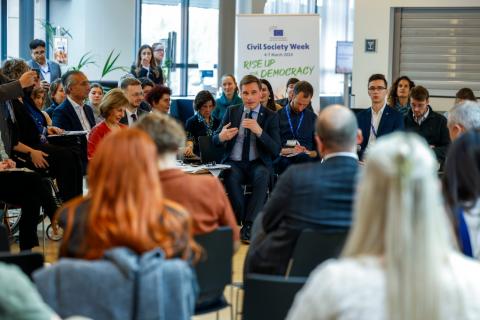European Economic
and Social Committee
European civil society sets agenda for next EU leaders
This week, the European Economic and Social Committee (EESC) hosted the first-ever Civil Society Week, where over 800 representatives from civil society organisations and youth groups gathered to discuss the incoming elections and the future of the EU. The takeaways will be incorporated into an EESC resolution in July that will outline what civil society expects from the incoming leadership of the European Parliament and Commission.
Oliver Röpke, EESC President, said: This week, we measured the pulse of the civil society in Europe and witnessed the rise of 'GenEU'. The message for the next EU leaders, which I commit to bring to their attention, is clear – more democracy and youth, less fake news and an economy that works for all. Europe cannot afford to ignore the voice of the civil society, the true watchdog of our democracies.
Pedro Silva Pereira, Vice-President of the European Parliament, said: The European Parliament, as the only institution directly elected by citizens, has been a natural partner in supporting civil society organizations' role in shaping Europe's policies and priorities. But more can be done. The work done during the EESC Civil Society Week has been truly remarkable, with a number of important proposals adopted that deserve to be taken seriously. From the European Parliament's side, our commitment is clear: we will continue working hand in hand with civil society to bolstering our public space making it more democratic and inclusive.
Responsive governance, inclusive policies and a sustainable future for all Europeans were the topics at the heart of the discussions. The first insights into the messages formulated by civil society organisations for the new EU leaders, among others, focused on:
- More action in combatting misinformation
- Creating an economy that works for people and the planet
- Stronger voice of the youth
- More democracy and improved follow-up of European Citizens' Initiatives (ECI)
Combating misinformation
Ahead of the European elections, youth representatives and journalists raised concerns about the rampant spread of misinformation and deepening online polarisation, particularly on social media platforms. They emphasised the urgent need for decisive action, including to develop robust legal frameworks to combat misinformation.
Addressing this complex challenge requires a multi-pronged approach. Understanding the importance of a digitally literate society, civil society organisations urge governments, schools, and tech companies to work together more closely. The goal is to help people develop the skills they need to judge online information carefully, creating a digital world that is rich in knowledge and open to everyone.
An economy that works for people and the planet
A central theme that emerged from the discussions was the need for an economic model that prioritises both people and the planet. Civil society actors call for a shift away from traditional growth-centric models and urge the EU to embrace a more holistic approach that takes into consideration well-being, prosperity and the limitations of our environment.
Youth organisations want the EU to make the proposal for a directive on corporate sustainability due diligence a reality. The directive would make companies more responsible and sustainable by considering human rights and the environment in their operations. They also call for special taxes on environmentally harmful goods, such as luxury items, with proceeds directed towards climate-friendly initiatives.
With AI changing the economic landscape, participants emphasised how important it was for the EU to remain a competitive frontrunner in the global digital transformation process. This leadership should be guided by ethical principles, democratic values and human standards. The EU has been urged not to foster fear and anxiety surrounding AI, but instead to educate citizens on the topic and enable them to live and work alongside it.
Empowering youth and strengthening democracy
Civil society insists that young people must be empowered to shape the future of Europe. Participants stressed that a ‘youth test’ must be implemented for all EU policies, thus ensuring that they are assessed for their impact on younger generations. Youth groups have been specifically advocating for the creation of youth quotas for the European Parliament elections. This, they argue, would ensure greater youth representation in the decision-making process and pave the way for a more inclusive and responsive EU.
Beyond youth involvement, a call for a more resilient and inclusive democracy resonated throughout the week. Participants demanded a Europe where civil society can thrive in a safe and enabling space. They emphasised the need for structured civil dialogue at all government levels, both within the EU and with candidate countries. This dialogue should be accompanied by capacity building to strengthen the civil societies – and ultimately the democracies – of candidate countries.
Moving beyond the suggestion box
This week also highlighted the potential and limitations of the European Citizens’ Initiative. While celebrating the successes of past initiatives in raising awareness and sparking public debates, discussions laid bare frustrations regarding the need for improved responsiveness and follow-up from the EU institutions.
Successful ECIs should mandate a substantive response from the Commission, including concrete responses and, where appropriate, legislative proposals. Participants called for stronger partnerships between organisers, civil society, the media and public partners, and for sharing best practices to empower citizen participation.
Looking ahead
Brikena Xhomaqi, co-chair of the EESC Liaison Group, stated: This week once again showed that we need a solid plan for European civil society. Let’s make things happen with a clear strategy, making sure Article 11 of the Treaty on Civil Dialogue is truly implemented, and securing our civic space and transcending borders.
These recommendations will feed into an upcoming EESC resolution setting out civil society’s expectations for the next European Parliament and Commission. As the EU prepares for the elections, the message from civil society is clear: build a more resilient, inclusive and sustainable Europe that caters to the needs of all its citizens, young and old, while safeguarding our planet for future generations.
Check out the early insights from Civil Society Week on the EESC website.
